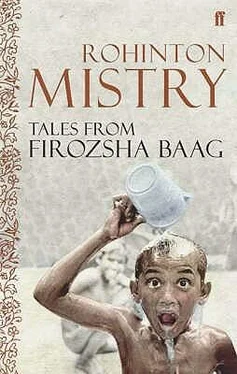Rohinton Mistry - Tales From Firozsha Baag
Здесь есть возможность читать онлайн «Rohinton Mistry - Tales From Firozsha Baag» весь текст электронной книги совершенно бесплатно (целиком полную версию без сокращений). В некоторых случаях можно слушать аудио, скачать через торрент в формате fb2 и присутствует краткое содержание. Год выпуска: 2006, Издательство: Faber & Faber, Жанр: Современная проза, на английском языке. Описание произведения, (предисловие) а так же отзывы посетителей доступны на портале библиотеки ЛибКат.
- Название:Tales From Firozsha Baag
- Автор:
- Издательство:Faber & Faber
- Жанр:
- Год:2006
- ISBN:нет данных
- Рейтинг книги:3 / 5. Голосов: 1
-
Избранное:Добавить в избранное
- Отзывы:
-
Ваша оценка:
- 60
- 1
- 2
- 3
- 4
- 5
Tales From Firozsha Baag: краткое содержание, описание и аннотация
Предлагаем к чтению аннотацию, описание, краткое содержание или предисловие (зависит от того, что написал сам автор книги «Tales From Firozsha Baag»). Если вы не нашли необходимую информацию о книге — напишите в комментариях, мы постараемся отыскать её.
Tales From Firozsha Baag — читать онлайн бесплатно полную книгу (весь текст) целиком
Ниже представлен текст книги, разбитый по страницам. Система сохранения места последней прочитанной страницы, позволяет с удобством читать онлайн бесплатно книгу «Tales From Firozsha Baag», без необходимости каждый раз заново искать на чём Вы остановились. Поставьте закладку, и сможете в любой момент перейти на страницу, на которой закончили чтение.
Интервал:
Закладка:
Boman was bitterly disappointed. What bloody nonsense about the three-monkeys principle. Where did the monkeys go when he did his income tax, or helped his clients with theirs? Henpecked hypocrite. And selfish. But still a smart man, that Boman could not deny.
Next he tried Rustomji, who gruffly dismissed the suggestion as impossible: “Sorry, but enough time I spend in courtrooms, as it is.”
And Najamai said: “Me, a widow, living all alone, how can I go falling in the middle of a court lufraa? . And at my age making unnecessary enemies. No bawa , please forgive me, you will have to find someone else.” This refusal hurt the most. She had shown so much concern all along. And now this blunt answer.
It might have tempered Boman’s bitterness had he known that it would not be long now before Najamai would, in fact, become their saviour; that Najamai, with a beckon of her arm, would deliver them from the paying guests, from the fate worse than a brain-devouring kaankhajuro .
But in the meantime he spent his days exhausting the list of possible witnesses in the Baag. When he began making petitions to those who were as good as strangers, he realized he was reaching the end of hope. The one man who would have helped him, as surely as there was earth beneath and sky above, who had been worth more than all of B Block put together, and who had more goodness in his dried scabs of psoriasis than in the hearts of all these others, was long dead: the kind and noble Dr. Mody. And Mrs. Mody now lived a cloistered life, spending her days in prayer and seclusion. He had gone to see her a few times, but on each occasion she came to the door with her prayer book in her hands and beckoned him away, making vague sounds from behind tightly shut lips: parting them for profane speech would have rendered everything prayed up to that point useless.
There was someone who would be willing to speak in court, Boman knew: the Muslim who lived in the next flat. But desperate as Boman was, he would not stoop to that, to ask him to testify against a fellow Parsi.
The time for Kashmira’s confinement came. She checked into the Awabai Petit Lying-in Hospital. Khorshedbai continued with her eleven o’clock routine, dancing her dance of disorder to the tinkling of bangles. Now Boman would clean up each night after visiting Kashmira at the hospital, and to see him crouching with broom and dustpan made Khorshedbai wild with delight. She could not hold still at the crack of her door, and kept dragging Ardesar up to make him look, against his will, at how low the mighty had to bend despite tie and jacket.
Poor Ardesar cowered inside, ashamed, and worried for her soul. His happiest moments came when he fed the pigeons at Chaupatty beach. He spent a lot of time there these days, alone: now Khotty refused to go. They waddled around his feet as he moved into their midst. He stopped every now and then, standing perfectly still, to let them pick playfully at his shoelaces. It made him sigh contentedly to see the way their throats trembled when they made their soft cooing sounds. The pigeons were the best part of living in this flat near Chaupatty beach. In the end, the neighbours were willing to testify against the paying guests. There were so many volunteers that Boman could have picked and chosen. Even Mrs. Karani assured him that she would make Mr. Karani be a witness, whether he wanted to or not, three monkeys or no three monkeys, so outraged was she about what had happened.
But as it turned out, there was no need. The paying guests went quietly: Khorshedbai first, by ambulance, everyone knew where; then Ardesar, no one knew where, by taxi.
It happened soon after Kashmira returned from her confinement, determined not to spend her days behind locked doors with the new baby. Parturition had endowed her with fresh courage and strength. So she strolled out on the veranda whenever her legs felt like stretching or her lungs longed for fresh air. Even at eleven o’clock she emerged undaunted.
Khorshedbai was not impressed by this new show of defiance. She continued to scatter and toss and sprinkle; the veranda, after all, was for common use as per the sub-tenancy agreement. But she was careful to skirt Kashmira’s immediate vicinity.
One morning, after Boman had left for work, Kashmira heard the soft, single flap of envelopes alighting on the veranda. The postman. She went to pick up the letters and stood scanning them: the ones for the paying guests landed back on the floor.
Then Najamai passed by in the compound and beckoned her out.
It was this gesture of Najamai’s, innocent and friendly, that was responsible for changing the tide of the neighbours’ apathy. Hers was the credit for the events now to follow, which would make them all eager to bear witness, but for which there would be no need because that single beckon in itself would get rid of the paying guests.
The gesture, potent as it turned out to be, would have been useless if Kashmira had elected not to go outside. Or if she had gone outside but returned quickly. Or if she had gone outside with the baby. Fortunately, none of these things happened.
Was there any little item, Najamai asked, that she could get for her while she was out shopping? Kashmira said thanks, but Boman usually got all they needed on his way home from work in the evening. What a good husband, said Najamai, then inquired about the new baby, and if there was any change in the madwoman’s behaviour because of the baby. None, said Kashmira, and she would rather die than let the lunatic’s shadow even fall upon the little one.
They stood by the steps of B Block, talking thus for some minutes: the precise number of minutes, as it turned out, that were required for the events (triggered by the beckoning arm) to gather momentum.
When Kashmira returned inside, the first thing she saw was the baby’s cot: empty. A vague fear of this sort of thing always used to lurk inside her. But she had managed to keep it bottled away under control in a remote part of her mind.
Now it escaped its bounds and pounded in her head, pumped through her veins and arteries, filled her lungs and the pit of her stomach. It felt ice-cold as it made its way. Call Boman, call the police, call for help, the fear screamed inside her, while the place where it used to be bottled up said stay calm, think clearly, take a deep breath. She rushed out to the veranda, willing to consider absurd possibilities: maybe the baby was precocious, already knew how to crawl, had crawled away, swaddling clothes and all, and was hiding somewhere.
While she dashed from room to veranda and veranda to room, a soft whimpering penetrated her panic. It came from Khorshedbai’s quarters. The door was ajar, and she peered inside. Uncertain of what she was seeing, she opened the door to let in more light from the veranda, then screamed, just once: a loud piercing scream. Behind it was gathered the combined force of the ice-cold fear and the place where the fear used to be bottled up.
Unaware of what her beckoning arm had precipitated, Najamai was almost at the end of the compound. She heard the scream and retrieved her steps. By then, Kashmira was yelling for assistance to any kind soul who could hear to come and save her child. Najamai repeated the cry for help outside C Block as she hurried towards B.
And help arrived within seconds. Later, Najamai would go over the list with Kashmira; from this day forward, in Najamai’s eyes the Baag had only two kinds of Parsis: the ones who had been shameless enough to ignore the call for help and the ones who had responded. Among the latter were retired Nariman Hansotia who was just stepping out to drive to the library, his wife Hirabai, Mrs. Karani from upstairs with Jaakaylee in tow, Mrs. Bulsara wearing her mathoobanoo , Mrs. Boyce, the spinster Tehmina in slippers and duster-coat, the watchman from his post at the compound gate — Najamai would remember them all, what they said, how they behaved, what they were wearing.
Читать дальшеИнтервал:
Закладка:
Похожие книги на «Tales From Firozsha Baag»
Представляем Вашему вниманию похожие книги на «Tales From Firozsha Baag» списком для выбора. Мы отобрали схожую по названию и смыслу литературу в надежде предоставить читателям больше вариантов отыскать новые, интересные, ещё непрочитанные произведения.
Обсуждение, отзывы о книге «Tales From Firozsha Baag» и просто собственные мнения читателей. Оставьте ваши комментарии, напишите, что Вы думаете о произведении, его смысле или главных героях. Укажите что конкретно понравилось, а что нет, и почему Вы так считаете.












